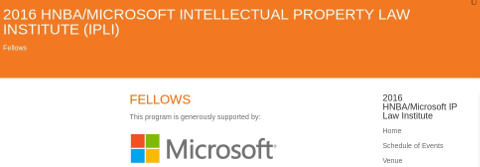

THIS article is a summary of recent USPTO news. It's as comprehensive as possible and it focuses, as usual, on software patents. Those are just most relevant to us.
"Anyone can probably see that USPTO greed (for both power and money) is going way too far."
"What we deal with here is a patent troll that claims it ‘owns’ scanning activity."Watch what the USPTO is up to. Basically, as usual, having seen the courts invalidating many of its bogus patents (minimal quality control is to blame here), it now looks to bolster/improve its business by making a mockery of the course of justice. What is this, a third world country? Anyone can probably see that USPTO greed (for both power and money) is going way too far. The USPTO is very plaintiff-friendly because plaintiffs are its 'clients' (applicants). The USPTO must be kept out of the legal process altogether. The same goes for the EPO (increasingly abusive in that regard under Battistelli's regime). Some people are now bombarding the patent system with more automated tools/robots (like DMCA requests that are bogus and served by algorithms, or trading activity in stock markets, also using algorithms). See this new press release about a "Proprietary Patent Application Software". These help exhaust, fool, mislead examiners. They even say "proprietary" as if it's some kind of marketing term. "Every bloody unit will be using proprietary software components jealously guarded by patents," said this article from 2 days ago.
"Patently-O noted that in some particular cases even antitrust laws creep in."In other new blog posts from Patently-O the MPHJ patent troll is revisited (it can come to Europe with UPC hooks perhaps, suing everyone who uses a scanner if all goes as Battistelli foresees). "HP challenged claim 13 on both obviousness and anticipation grounds," noted Patently-O, after MPHJ had already sued so many people who habitually use a scanner at a business (and often retrieved 'protection money' without as much as a legal challenge). What we deal with here is a patent troll that claims it ‘owns’ scanning activity. It's really about as bad as it sounds. No exaggeration is needed, hence it resulted in plenty of press coverage over the years.
"When a nation's patent system mostly serves to protect one's giant (and often taxpayers-funded) monopoly the perception of corruption will inevitably increase."Yes, nice to have 'justice'... whoever has the deeper pockets (or less to lose) tends to win. Who benefits from all this chaos? Patently-O noted that in some particular cases even antitrust laws creep in. To quote this new post about GlaxoSmithKline (GSK): "The question in the case, now pending before the U.S. Supreme Court is whether that license structure can raise a plausible antitrust claim under F.T.C. v. Actavis, Inc., 133 S. Ct. 2223 (2013)."
When a nation's patent system mostly serves to protect one's giant (and often taxpayers-funded) monopoly the perception of corruption will inevitably increase. Who's being served here? The public that will consequently be overcharged and have few (or none at all) alternatives? Going back to the false testimony, Patently-O wrote: "On cross-examination, Rembrand’s technical expert witness Dr. Thomas Beebe “drastically” changed his testimony regarding his methodology for testing whether the accused contact lenses were “soft.” After being called-out by the defense’s expert Dr. Christopher Bielawski, a jury found no-infringement. Post-trial, the district court doubled-down by also granting J&Js motion for JMOL of non-infringement. Bielawski’s testimony may have been particularly damaging – with his statement: “You should not trust Dr. Beebe, and you should throw out his testimony, not in part, but in whole. You should not trust Dr. Beebe.”"
"A patent system of secrecy defeats the very purpose (original goal) of the patent system."Judging any case at all based on written/oral testimony is dangerous and misguided. It's like using the words of cops or some errand bystanders as evidence in criminal trials. Any such 'evidence' is the weakest form of evidence because there is no way to ascertain/verify claims. Moreover, people are often corruptible and when there's much at stake in a trial (not just prison but a lot of money) there's plenty of room for abuse, such as bribery. Remember those infamous cases of Apple with jury foreman Hogan? Probably trial misconduct. Don't forget Court of Appeals for the Federal Circuit (CAFC) corruption either.
Pressing on, the EFF celebrates progress in a patent case it intervened in one year ago. It says it "has put significant time and effort into getting this one document in one case unsealed. Unfortunately, it is just one of countless documents that are routinely sealed without good reason in patent cases around the country. Just last week we asked the court in a different patent case to unseal documents that almost surely should not have been completely hidden from public view."
"It is worth adding that while the number of lawsuits did provably decline it does not tell the full story for more than a single reason and we should generally take with great degree of caution any conclusions that accompany this, e.g. that things are improving on their own, hence no intervention is needed at all."
"And some people keep telling the world that Microsoft has changed or that there's a 'new', gentler Microsoft..."Well, universities that essentially behave like patent trolls or feed trolls with their patents (we gave many examples here before) might suffer. And if so, that's a good thing. The article later says: "Business coalition United for Patent Reform – whose membership includes influential allies of the Obama Administration like Google, Amazon and General Motors – and other supporters of HR 9 seek to stop patent trolling by making it riskier to file patent infringement suits and imposing additional costs of plaintiffs, but AAU argues this would put undue pressure on legitimate patent holders."
'“Other than Bill Gates, I don’t know of any high tech CEO that sits down to review the company’s IP portfolio" —Marshall Phelps